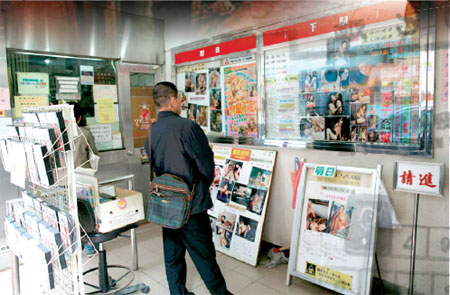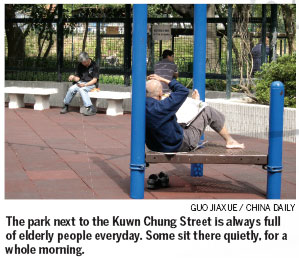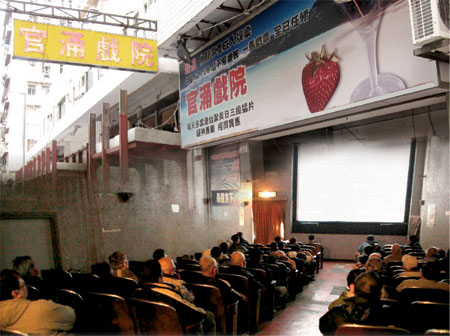Nothing to do, no place to go
Updated: 2011-06-30 08:08
By Guo Jiaxue(HK Edition)
|
|||||||
|
The signboard of the Kuwn Chung Cinema, now being torn down. Guo Jiaxue / China Daily |


For the grassroots elderly people of Hong Kong, life has resolved into an enduring extension of days of nothing to do and no place to go. The situation doesn't appear to be improving - actually it is getting worse as demands for urban expansion overtake the places where those on limited income may gather. Guo Jiaxue reports.
Kwun Chung Street is an old, undistinguished, residential lane, all but lost around the corner from Tsim Sha Tsui, one of Hong Kong's busiest areas. It's hard to identify what shops are here from any distance, since the street serves as a convenient parking lot for long queues of commercial vans that block store fronts from view.
From a birds' eye view, the neighborhood is an oddity, squeezed in between the lavish environs of West Kowloon to the west and busy Nathan Road crammed with gold shops and tourists to the east. Grassroots elderly from the neighborhood don't even belong in those adjacent neighborhoods. They have no money. According to government population statistics in 2006, more than 6,000 families in Yau Tsim Mong District were earning less than HK$2,000 a month. Here the observer is confronted with an isolated island of impoverishment, lost amid a sea of commercialism.
The sunlight strains but dimly down to the pavement on this narrow street. Passersby are mainly people who live in the apartments up above the commercial shops. Nighttime sees the street darker and even more deserted.
One shop that draws more notice than others is vacant. At the front is a sign emblazoned with the word: "Leasing". Still, people stop here and snap photographs, evidently indulging some nostalgic urge. Up until March this year, there was a pornographic cinema here, although the establishment hardly merited the name cinema. Video room probably would be more apt.
It's is difficult to fathom why this evidently unpromising locale saw commercial property rentals leap 80 percent in recent times.
"I don't know it exactly, but it's more or less 80 percent," Hui Tak-leung, a Yau Tsim Mong district councilor, said, trying to recall the rent increase that drove out the cinema. "The shop owner believed there was huge business potential ... Time has changed, the property prices are climbing up constantly."
The rent hike spelled the end of the 18-year tenure of the cinema on Kwun Chung street. Business had been poor anyway. But it may have been Hong Kong's last cinema featuring pornographic films. And that made the vacant premises a draw for nostalgia buffs to come and take pictures.
People in the neighborhood are reluctant to talk about the old movie house.
"They don't wanna talk. It's like, 'I went to watch porn movies', equals to 'I am a randy old goat'," said Hui.
Nevertheless the old dirty pictures establishment is missed. Some people feel its absence, anyway.
"Old people who live here play chess at parks. They go to the cinema on hot days. What's most important is for them to have a place to meet and chat," he said.
Hui believes the sense of loss in the wake of the porn cinema closure reflects the lack of elderly facilities in Hong Kong, especially in old districts like Yau Tsim Wong.
"You see many old people sitting in parks - very few of them play cards or chess - most just sit, have nothing to do, just sitting there for a whole day. And they are all male."
So, the cinema was not strictly about pornography. It was an air-conditioned refuge for the old folks on hot days.
Places like Kwun Chung Cinema were "suitable" for them. A HK$40 ticket was the price of admission for the whole day. They could sit and chat in the coolness of the air-conditioned space, watch movies, even doze off, the district councilor said. They couldn't get away with that in a modern multiplex cinema.
"But now they've lost the place," said Hui.
That's the thing. These grass-roots elderly don't really have much choice about where to go in neighborhoods like these. Most of the crowded old residential structures are more than 40 years old. The people are getting old. "Young people are moving out," Hui said.
"Community features." Hui shrug his shoulders, "It's sad, seeing so many old people on the street all day long, don't know where to go, and no one talk to them."
That social reality cannot be overstated. The King George V Memorial Park, just one block away from the Kwun Chung Street, is full of the elderly everyday. There is barely an empty seat, especially during cool and comfortable days in spring. Only a few can be seen reading newspapers or taking exercise. Most just sit, staring into the distance, apparently disinterested in everything.
Ching who lives nearby is one. The 70-year-old spends a lot of time in the park.
"Too many cars, people, and tail gas too. There is no room outside," he said slowly. He sits to escape the cacophony of automobile engines. He has no hobbies. "Mahjong? No. It costs money..."
The onset of summer makes sitting in the park nearly intolerable. Ching tries to escape to the shopping malls of Tsim Sha Tsui, where he finds relief under the Arctic blast of the air-conditioning.
These elderly, idle people leading empty lives eagerly embrace almost anything that gives them something to do. A few steps farther along Kwun Chung Street, from the old porn cinema, is a shop called Carrot House. It opened early this year. Elderly folk can be seen waiting in long queue every morning, waiting for the shop to open. The doors open. The people are let in. The doors are closed. Music and muffled voices over a microphone can be heard. But the place has no window to the outside world, nor perspective from the outside looking in.
Googling "Carrot House" reveals a business that has engaged in the sale of expensive so-called health food to elderly people for years.
But cheap gathering places for elderly folk are becoming more and more rare. Kwun Chung Street appears on the verge of a real estate boom. The demise of the old cinema is simply an early sign of changing times.
The high-speed rail link terminal, the West Kowloon Cultural District, and more luxury properties are all under construction just next to the old district.
"Once the high-speed rail starts to run, the commercial value will be much higher," Hui said.
The ground-floor shops under these old buildings have already begun to show their values.
The local barber shop moved away from the street in April. Austin Road, connecting Kwun Chung Street to the south, has totally transformed. Eight property agency shops have blossomed there, at one side of the street, extending a distance of two blocks. Quite spectacular, they are. The high-powered lights emanating from the agency shops are bright enough to turn night into day.
Another shop selling tableware closed, replaced by a glittering Sasa cosmetics shop.
To that degree, the convenient location is no convenience for people who live there. The neighborhood is not out of the way, in the fashion of public estates.
"For example, in Wong Tai Sin and Lok Fu, there are malls and plazas where they can stay and sit. But we can't sit as we like in private places," Hui said.
The district councilor called for the government to build some in-door public facilities in these old districts like Yau Tsim Wong so that the elderly can stay as long as they want.
"Maybe a multi-floor, multi-purpose center ... That would be good for the neighborhood," he said.
(HK Edition 06/30/2011 page6)
